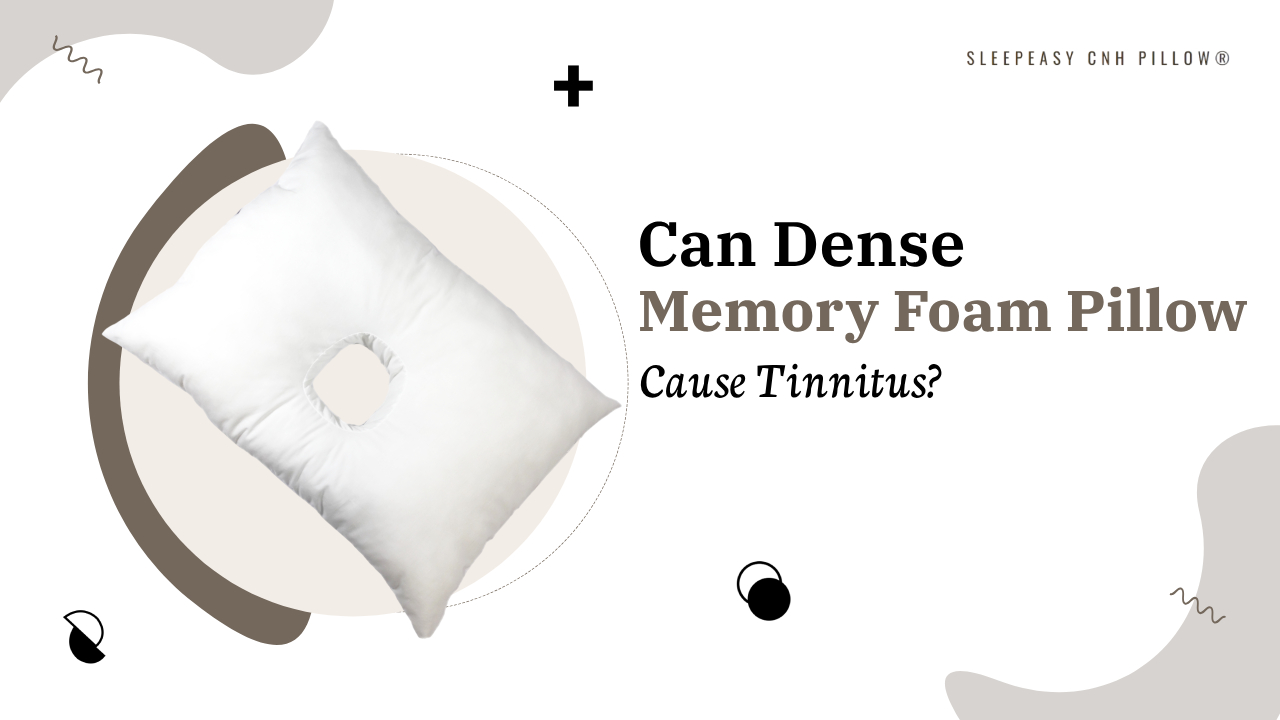Can Dense Memory Foam Pillow Cause Tinnitus?
Oct 9th 2024
Tinnitus, indicated by the perception of ringing or other sounds in the ears without an external source, can be frustrating and sometimes tiring. Many individuals seek ways to relieve their symptoms, wondering how to stop tinnitus ringing. One common question is whether dense memory foam pillows contribute to or worsen their tinnitus.
Key Highlights
- Tinnitus is a symptom, not an illness - usually ringing or buzzing in the ears, which may be contributed to by other medical conditions.
- Dense Memory Foam Pillows will provide support but can also create pressure points and other challenges impacting ear health.
In this blog post, we’ll explore the potential relationship between memory foam pillows and tinnitus, examining the factors involved and offering insights.
Understanding Causes of Tinnitus
Before diving into the relationship between memory foam pillows and tinnitus, it’s important to understand what tinnitus is and some of the common tinnitus causes. Tinnitus can result from various factors, including:
- Age-related hearing loss: As we age, natural hearing weakening can lead to tinnitus. Consider using an easy-sleep cotton pillow at this age.
- Noise exposure: Loud sounds from concerts or construction sites can damage the inner ear and trigger tinnitus.
- Ear infections: Infections can trouble the delicate structures within the ear, leading to tinnitus symptoms.
- Medications: Certain drugs, like aspirin and specific antibiotics, can cause tinnitus as a side effect.
- Underlying medical conditions: Conditions such as high blood pressure and hypertension can also contribute to tinnitus. Many ask, can high blood pressure cause tinnitus? Yes, it can lead to increased pressure on the auditory nerves.
Possible Relationship Between Memory Foam Pillows and Tinnitus
Quality sleep is important for overall health and well-being and can also play an important role in controlling tinnitus symptoms. Although there isn’t definitive scientific evidence directly linking dense memory foam pillows to tinnitus, several factors deserve consideration:
Pressure Points
A memory foam pillow can be quite dense and, therefore, pressure the head and neck regions in particular directions if it is not supportive enough or preferably aligned for support and positioning. This pressure can give rise to discomfort that aggravates whatever tinnitus is there.
Sound Amplification
Some users observe that the density of memory foam causes "trapping" of sound waves or vibrations, thereby leading to tinnitus in sensitive listeners.
Allergies and Irritants
Some of the memory foams release VOCs along with other allergens that may exacerbate inflammation or sensitivity in the ears leading to worsening of tinnitus.
Sleep Position
Sleeping Position can also impact ear pressure or discomfort. Misalignment caused by a memory foam pillow may indirectly contribute to jaw and neck tension and may worsen tinnitus. A poorly supportive pillow can also increase sleep apnea, a condition where breathing stops during sleep.
Neck and shoulder pain
If a pillow is too tight or fails to provide sufficient support for your neck and shoulders, it can lead to discomfort. This discomfort may create a disturbance in sleep and contribute to stress, potentially exacerbating tinnitus symptoms.
Identifying Symptoms
If you suspect that your pillow is the cause of your tinnitus, the following are some symptoms to watch for:
- Sounds ringing or buzzing that does not stop in one or both ears
- Noise sensitivity
- Ear fullness or pressure
- You feel pain at the back of the jaw or neck
- You become disturbed by the ear sounds or you cannot sleep
Solutions and Recommendations
If the tinnitus problem you seem to have brought about is that of your dense memory foam pillow, here are some solutions that you may look into:
- Pillow Support: Sometimes, a softer or less dense pillow will provide sufficient support with minimal added pressure.
- Sleeping Position: Side sleeping is more likely to exacerbate ear pressure; sometimes switching to a back sleeping position can alleviate the pain.
- Materials: Use hypoallergenic pillows made from natural materials that are less likely to create irritants.
- Consult a Professional: When tinnitus does not disappear, it is then very crucial to visit a healthcare provider or an audiologist.
- Sound Therapy: Using white noise machines or soothing soundscapes can mask tinnitus sounds or help sleep better.
- Manage Stress: Engaging in relaxation techniques such as meditation, yoga, or deep breathing exercises may generally help eliminate other symptoms.
Choosing the Right Pillow for Tinnitus Relief
If you’re concerned about how your pillow might be affecting your tinnitus, consider the tinnitus pillow or the following factors when choosing a new one:
- Support: Look for a pillow that supports your head, neck, and shoulders.
- Materials: If you have allergies, try to look for pillows made from hypoallergenic materials.
- Comfort: Ultimately, the best pillow is one that you find comfortable and that promotes restful sleep.
Conclusion
While a thick memory foam pillow is unlikely to be the sole cause of tinnitus, it might exacerbate or cause discomfort among some individuals. Understanding how your pillow affects your sleep and well-being is paramount when you expect proper management of tinnitus. Making informed choices about your sleep environment and seeking professional advice will improve your quality of sleep and even relieve tinnitus symptoms.
FAQ's
How Long Does Tinnitus Last?
For many, the time of tinnitus can change. While some experience temporary symptoms after exposure to loud noise, others may face chronic tinnitus that persists for months or even longer. In some cases, tinnitus may fix itself, while in others, it may require treatment and management.
Can Noise-Cancelling Headphones Cause Tinnitus?
While noise-cancelling headphones are created to reduce background noise, lengthy use in loud environments may still contribute to hearing issues, including tinnitus. If headphones are used at high volumes or in settings with loud sounds, they can lead to ear pressure or discomfort, potentially declining tinnitus symptoms. It's important to maintain safe listening levels and take routine breaks.



